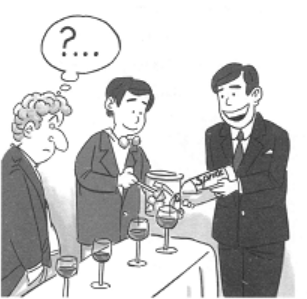Like most cultures, the Chinese drink different kinds of alcohol at different occasions.
Beer is a casual drink among friends, families, and colleagues. The Chinese can drink beer in copious amounts. I remember when I came to China as a college student one summer. My friends at the Chinese universities would order a huge bottle of beer for each person. I was surprised to find that a big bottle of local beer was a lot less expensive than a bottle of water at that time.
Red wine is the drink of choice when you meet with senior officials in the government or with important clients for the first time. It is seen as a more elegant drink. One would usually order an expensive bottle of red wine but would sip it slowly. It is not a drink one would go "bottoms up" in toasts. It is not unusual, however, to see Chinese add ice cubes and Sprite to their glasses of red wine. Bryan and I had a business lunch with the head of a big publishing house in Beijing a couple of years ago. We ordered a nice bottle of Chinese-made red wine for our guest. The gentleman asked for ice cubes and some Sprite to put into the wine. It was the first time we had seen that done, so out of respect, both of us quickly added ice cubes and Sprite to our glasses as well.

The hard liquor known as "bai jiu" is favored by people in northern China. It is a very strong grain alcohol which can be upwards of 120-proof. People typically drink this hard alcohol for two reasons. First, it is a way to loosen up. Getting a little drunk is not a social embarrassment in China. On the contrary, allowing yourself to get a little drunk is a sign that you are lowering your inhibitions and are becoming friends with your drinking partners. In northern China, friendships are cemented after you have gotten drunk with your Chinese business partners. Second, offering hard liquor is a business strategy to get the other to agree to otherwise difficult business terms. If one is drunk, he is more likely to say "yes" to things he would not have when sober.
After attending a few dinners with Chinese business partners, Bryan commented that fortunately he had a high level of alcohol tolerance from when he was the president of a fraternity house in college. On most occasions, he can out-drink his Chinese colleagues, or at least hold his own, and this has helped him establish both friendships and credibility with his associates.
(selected from 101 Stories for Foreigners to Understand Chinese People by Yi S. Ellis and Bryan D. Ellis, published by China Intercontinental Press in 2012)

